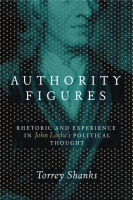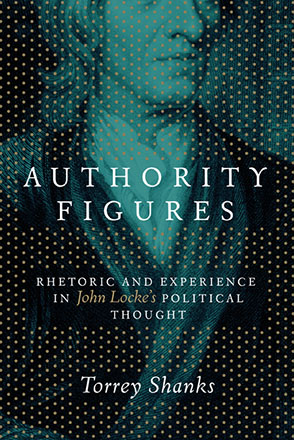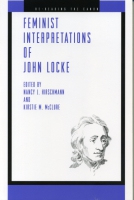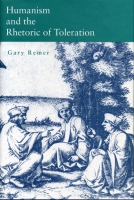Authority Figures
Rhetoric and Experience in John Locke's Political Thought
Torrey Shanks
“Many canonical authors in political theory have been read with fresh, even radical, insights in the past decade, but Locke seems to be particularly resistant to such rereadings. In Authority Figures, Torrey Shanks has managed to pull this off. She does so by reading Locke as an ‘Epicurean materialist’—that is, as someone with an appreciation for the unexpected, the unpredictable, and the unforeseen. Shanks demonstrates that Locke practices a set of rhetorical strategies that reflect and enact this Epicurean materialism in his texts. Once you start to read Locke in this way, everything changes, becoming deeply contingent. The rigid and unyielding Locke whom we all grew up reading becomes an altogether different figure—a difference with important consequences for how we read Locke politically.”
- Description
- Reviews
- Bio
- Table of Contents
- Sample Chapters
- Subjects
Authority Figures draws together political theory and philosophy, the history of science and of rhetoric, and philosophy of language and literary theory to offer an interpretation of Locke’s political thought that shows the ongoing importance of rhetoric for new modes of critique in the seventeenth century. Locke’s thought offers up insights for rethinking the relationship of rhetoric and experience to political critique, as well as the intersections of language and materialism.
“Many canonical authors in political theory have been read with fresh, even radical, insights in the past decade, but Locke seems to be particularly resistant to such rereadings. In Authority Figures, Torrey Shanks has managed to pull this off. She does so by reading Locke as an ‘Epicurean materialist’—that is, as someone with an appreciation for the unexpected, the unpredictable, and the unforeseen. Shanks demonstrates that Locke practices a set of rhetorical strategies that reflect and enact this Epicurean materialism in his texts. Once you start to read Locke in this way, everything changes, becoming deeply contingent. The rigid and unyielding Locke whom we all grew up reading becomes an altogether different figure—a difference with important consequences for how we read Locke politically.”
“Authority Figures offers an original and provocative account of Locke by focusing on his use of metaphors and rhetorical figures. Torrey Shanks addresses several central themes in political and social theory—the place of rhetoric in political thought, the importance of creativity in critique, the role of rationality in judgment and consent, and the use of authority in maintaining as well as critiquing order—as she traces the revolutionary implications of Locke's use of language. This is a book that should be of interest to a wide range of social and political theorists.”
“Authority Figures is a real achievement of interdisciplinary scholarship, revealing how rhetoric and early modern Epicurean materialism informed Locke's conceptions of authority, contract, and reason. In Torrey Shanks's elegant and nuanced account, Locke's use of figural and imaginative language becomes exemplary in the most instructive sense of the word, illustrating the inventive dynamics and sensibilities of politics. This genuinely new interpretation of Locke persuasively makes the case for attending to rhetoric, imagination, and affect in his political and philosophical thought.”
“Shanks has offered an intriguing, inventive, and provocative re-reading of Locke and his modes of persuasion and political engagement. She has illustrated some of the power of refigurative rhetoric in the work of critique.”
Torrey Shanks is Assistant Professor of Political Science at the University at Albany, State University of New York.
Preface
Acknowledgements
Chapter 1: Rhetoric and Situated Political Critique
Chapter 2: The Claim to Experience
Chapter 3: Sensible Judgment
Chapter 4: Feminine Figures and the Rhetoric of Critique
Chapter 5: The Matter of Consent
Conclusion: Critical Temporalities
Bibliography
1
Rhetoric and Situated Political Critique
The emergence of modern political theory in the seventeenth century marks a watershed moment in which new conceptions of human reason take center stage in theorizing the foundations and limits of political authority and community. This elevation of modern reason is widely seen as bringing about a break with the rhetorical tradition, inaugurating a supposed hostility between rhetoric and political theory that continues to resonate today. In this book, I challenge this assumed enmity between political theory and rhetoric through the unlikely figure of John Locke. Traditionally cast in a dual and decidedly modern role as rationalist in political theory and empiricist in philosophy, Locke is rarely seen as a friend to rhetoric. This opposition confirms latter-day assumptions about reason’s incompatibility with rhetoric that are familiar to late modern readers. By contrast, historians of rhetoric, philosophy, and science provide compelling reasons to reconsider this opposition in the early modern period, especially with regard to early empirical philosophers such as Locke. Locke’s relationship to the rhetorical tradition, as we will find, is better understood as one of debt and denial. While Locke undoubtedly voiced criticisms of the power of eloquence to lead us astray, I contend that Locke draws on rhetoric in fundamental ways in both his philosophical and political writings. Specifically, his appropriation of elements of the rhetorical tradition is indispensable for his critical engagements with philosophical and political authority. Rhetoric offers Locke a productive and creative capacity that sustains his challenge to reigning doctrines of his day as well as his reimagining of social and political membership. Locke’s debt to rhetoric undergirds his new vision of political community reliant upon an ongoing practice of critical judgment.
Rhetoric and Political Theory
The notion of the lasting significance of a momentous break in the early modern period between rhetoric and political theory is given particularly clear formulation by Bryan Garsten in Saving Persuasion. Garsten identifies a “rhetoric against rhetoric” in the work of Hobbes, Rousseau, and Kant that inaugurated a powerful legacy of suspicion and distrust of rhetoric in political theory. Juxtaposing the treatment of rhetoric and politics by Aristotle and Cicero with the work of these early modern critics, he shows how a particular modern distrust of rhetoric is inextricably tied to a suspicion of persuasion and political judgment more generally. The lasting effects of this hostility between rhetoric and political theory persist today—most notably, for Garsten, among those theorists who seek to ground democratic deliberation and authority in rational rather than persuasive discourse. By contrast, Garsten seeks to revalue political judgment that appeals to arguments and audiences located on the contingent terrain of politics, and for this he turns to the insights of the rhetorical tradition. Rhetoric, in this tradition, is not restricted to “merely” eloquent speech; rather, it involves a mode of action and interaction of situated political actors and spectators seeking influence and appealing to one another’s judgment. Moreover, we find that the status of rhetoric is a central question for the practice and theory of politics. This was clearly the case for early modern theorists, and it should be recognized as such by political theorists today.
Saving Persuasion rightly invites us to see rhetoric as centrally important for political thought, but its definition of rhetoric as “speech designed to persuade” puts significant limits on this relationship. To conceive of rhetoric in terms of persuasion is an important corrective to political theories that assert the need for an external point or prior agreement from which to assess social and political arrangements. Appealing to judgment from “within our existing opinions” recalls political theory to the finite terrain of politics, marked indelibly by disagreement between diverse opinions and beliefs of passionate actors. Working with such a narrow definition, however, cuts short the political possibilities and projects that rhetoric might sustain. In particular, a politics of persuasion cannot account for the possibility that existing opinions and beliefs, serving as the grounds of judgment, may prove inadequate to current and emerging political conditions. A political community may find existing categories inadequate because of unpredictable events or the contingent consequences of human action, such as the novelty that characterizes both political freedom as well as the rise of totalitarianism, as Hannah Arendt reminds us. A political community, or some part of it, may need to challenge common opinions and beliefs because they are inadequate to their claims of freedom or justice. A rhetoric identified only with persuasion among existing opinions cannot provide the basis for this indispensable form of critical judgment.
How do political communities generate such new categories for challenging social and political arrangements? If they come from within established norms and practices, how can they achieve critical purchase on the status quo? These questions invite many to assert that claims to freedom and justice require a position external to politics, detached from customary practices and prejudices. Such an external position can be found in Rawls’s original position as well as in Habermasian norms arising from, but ultimately transcending, specific historical and cultural locations. In their seeking universality, it is precisely their ultimate detachment from particular social and political contexts that is a necessary condition of their normative purchase. Rhetoric and imagination may even be brought into the service of this desired detachment in the form of thought experiments and exemplary rhetorical cultures. Yet the goal of such an external standpoint toward politics, whatever its debts to rhetoric and imagination (avowed or not), posits a fundamental distrust of the political judgment of the people. The idea of a view from nowhere, the Archimedean point, signals a flight from politics in general and democracy in particular. It is only through politics that relations of justice and the conditions of freedom are secured in practice, that is, as lived experience.
Extending this critique further, we must keep in mind that insofar as such an external position is linked to abstract universalism, aspiring to detachment from particular political conditions limits the normative value of the plurality and material differences that condition and constitute political life. Abstract universal norms often have been credited with delegitimating practices emphasizing class-, sex-, or race-based distinctions. Through their abstract and universal character, however, the validity of such norms is achieved by virtue of a perceived break with the embodied, socioeconomic, and cultural particularities of social and political life. So generating new categories for judgment, in this vein, also requires a flight from the plural and material conditions of political life. For this reason, situated political critique—that is, critique for which the contingent and particular relations and practices of politics are both condition and object—poses what appears to be a dilemma: how can we gain critical purchase on our social and political arrangements if our criteria are generated from within those practices? How, in other words, can political critique be enacted from within the field of politics without reproducing the status quo?
The politics of persuasion cannot respond to this problem of situated critique. It cannot respond because judgment appealing to existing opinions alone does not account for the emergence of new ways of understanding existing social and political practices or ways of envisioning how they might be otherwise. That is not to say, however, that there are no other resources in the rhetorical tradition or early modern political thought for considering this important problem of situated political critique in a new way.
Beyond Persuasion
Looking to the rhetorical tradition, we find a more capacious understanding of rhetoric that goes beyond the dignity of persuasion. Such conceptions of rhetoric, as we will see, offer rich resources that sustain political critique. Where conceiving of rhetoric as “mere” persuasion has long been a hallmark of philosophy’s valorization of reason alone, Ernesto Grassi’s account of the rhetorical tradition redirects our attention to a much more productive and theoretically significant role, also originating with Cicero. Conceived of as an imaginative language, rhetoric in Grassi’s understanding reaches far beyond its instrumental uses to encompass the creation of new meaning. Such new meaning is not created in a vacuum but, rather, works creatively from within particular social and linguistic practices. In this way, rhetoric uniquely offers the capacity to develop new ways of thinking in response to contingent and novel circumstances and the changing needs of human life. Rhetoric provides indispensable resources for critique situated on the finite terrain of politics.
Insofar as we conceive of philosophy as proceeding by the force of logic to the exclusion or subordination of rhetoric and its play of imagination on the passions, our thought remains tethered to the first principles from which deduction follows. From where do we get the original insight into such first principles and what is the source for new models of thought? How, in other words, could we proceed beyond mere repetition with deduction alone? The discovery of the conditions of rational thought, Grassi argues, lies not in logic but in the imaginative power of figural language to generate new ways of ordering and presenting images on which speech that is both reasonable and effective depends. Metaphor and analogy are essential for generating new images and frameworks out of familiar terms. Such figural language entails a borrowing, or transfer, of familiar words into unfamiliar relation. to produce new meanings. It is, in other words, to discover or invent a new relation, not derived from fact or through logic, but by virtue of the ingenious activity of the speaker. This capacity of ingenium, a distinctive human ability for making meaning, works by joining the diverse and disparate. It “reveals something ‘new’ . . . something ‘unexpected’ and ‘astonishing’ by uncovering the ‘similar in the unsimilar, i.e. what cannot be deduced rationally.’” Understood this way, rhetoric does not simply adorn or destabilize philosophy’s reasoned arguments; rather, it makes possible the production of new spaces for arguments and shared meaning. As Grassi writes, “Insofar as metaphor has its root in the analogy between different things and makes this analogy immediately spring into ‘sight,’ it makes a fundamental contribution to the structure of our world.” To critically orient ourselves to the situated world of politics, rather than idealizing detachment, requires the creative power of rhetoric, unleashed through metaphor. Rhetoric as imaginative language is indispensable for envisioning our social and political arrangements in new and different ways.
To consider rhetoric as an indispensable capacity for critique then requires a shift in perspective from philosophical tradition. Always situated and dialogic, rhetoric presumes a particular audience, a relation between speaker and audience(s), located in a specific time and place. The appeal to audience (or readers) may be explicit in the text or it may come by implication through the repetition of a familiar image or idiom. In both cases, the text marks its position within relations between speaker and audience. This situation invites us to read in new ways, even philosophical texts, attentive to what Mikhail Bakhtin calls heteroglossia. To tend to this plurality of modes of speech within a text is to be aware that words and phrases, idioms and images, are not always deployed to produce and reproduce meaning in the same ways. Instead, we must tend to the moments when meanings are pluralized and decentered, following the play of style and argument and attuned to the possibility of language being deployed in new ways or even turned against itself, as in parody or satire. The presence of multiple and varied modes and forms of address does not necessarily mean that rhetoric has overtaken philosophy, undermining rational thought. On the contrary, stylistic and figural invention, framed by the text’s appeals to readers, can be recognized as contributing essentially to philosophical and political arguments themselves. Dialogic and heteroglossic dimensions of the text may challenge norms of philosophy’s monologic forms of address. They can also, however, reveal the essential and transformative role of imaginative and inventive language in launching new modes of judgment and critique that lie at the heart of the philosophical enterprise.
Also of Interest
Mailing List
Subscribe to our mailing list and be notified about new titles, journals and catalogs.






